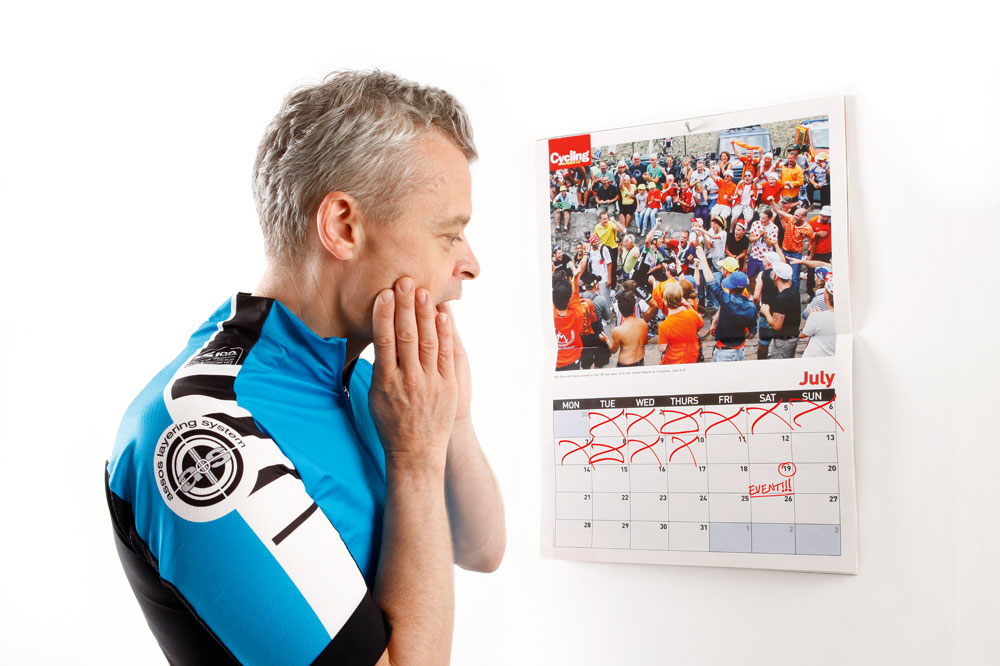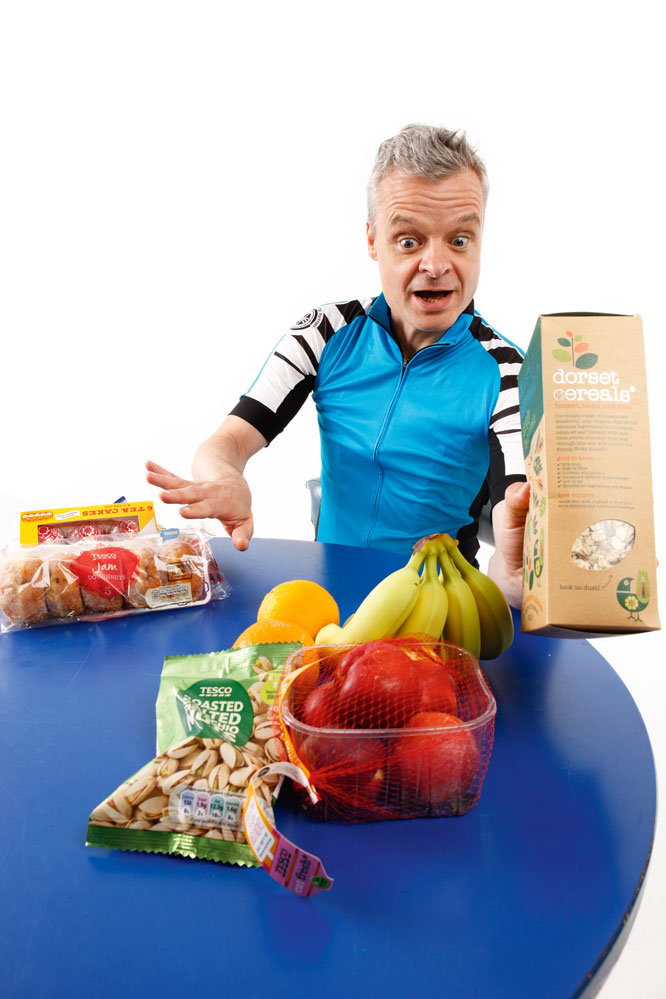Panic training! Maximise your last-minute sessions
If you’ve got a big event coming up and you haven’t put in the miles then you may be tempted to cram in some panic training. This is typical of many bike riders who potter along for 11 months and then go mad for two weeks before their biggest event of the year, er... so we’re told...

The latest race content, interviews, features, reviews and expert buying guides, direct to your inbox!
You are now subscribed
Your newsletter sign-up was successful
It doesn’t matter how often you read or are told about the importance of building up to an event and having a long-term plan, there will always be those who leave it to the last minute.
Probably the same people you’d see doing their homework on the bus on Monday morning or find in the library at midnight the day before dissertations are due.
If you have done less than you should have, our advice is: don’t panic! If you try and catch up on weeks or months of lost training then you are likely to either get ill, injured or at the very least start your event feeling fatigued.
But that doesn’t mean you can’t improve your chances of doing well. There are plenty of ways you can improve your riding, even if there is very little time before your event. We take a look at some of strategies you can employ to help your event go more smoothly.
Change today
How you approach an event, what goals you set for yourself and how you mentally prepare can have a big difference on how you feel about the outcome. Firstly, if you know you haven’t put in the right amount of preparation you’ll need to rein in your expectations.
Take into account the training you have done and your current fitness levels. Set a realistic target for where you are right now. Beating that lower target will feel a whole lot better than aiming too high and falling a long way short.
The latest race content, interviews, features, reviews and expert buying guides, direct to your inbox!
See this event as a marker or stepping stone to achieving the higher aim later in the season or coming back next year with more experience to do the same event and smash this year’s time (having prepared properly).
“Water will suffice for anything under 90min ”
Bike handling skills — Improving your bike handling skills can make a huge difference to your performance, even if your fitness stays the same. An hour spent on developing skills will, at this stage, make you faster than an hour of training will.
When you are fit you can bully your way up the outside of the bunch into the wind or let a gap go because you can’t corner as fast safe in the knowledge you are strong enough to chase back on.
Canniness can be a substitute for fitness. Position yourself well, always stay out the wind and make use of the natural advantages the course provides. Use the downwards slope before a climb to build your momentum and let the hill slow you down not your brakes so you aren’t robbing yourself of speed. It’s all simple stuff but when you know you aren’t fit anything that helps you save energy is a good thing.
Prepare your bike — A well-looked-after bike can also help you save energy and perform better. The temptation for many riders is to ‘buy’ speed and, to a certain extent, this is possible. If it makes you feel better and you’ve got the cash to spare, then buying something new for your bike can be highly motivational. But the most important thing is a bike that works properly.
Getting your bike sorted so that it is functional, runs smoothly and won’t let you down is a much easier task than doing the same for your body! Slipping gears, worn chain, uncomfortable saddle or old tyres can all ruin your day.
Don’t stop at your bike — check your seatpack and spares are all in good nick and that you have all the clothing that you need, too. By making it as easy as possible to complete your ride in comfort, you’ll doubtless make it faster, too.
Change in a week
Diet — Cleaning up your diet will help you feel and perform better. Eating well and training well often go hand in hand as good habits tend to reinforce each other. Conversely, a lack of exercise and not feeling fit can lead to paying less attention to your diet, compounding the problem. In training terms a week will do little to help improve your fitness but eating well for a week can help you to feel more energetic.
Strip out the rubbish from your diet, top up on your greens and fresh fruit but go easy on the heavier processed carbs such as pasta and white bread. You don’t need to ‘carbo-load’ for days before a long ride, especially if you haven’t been training particularly hard as it is unlikely that your stored muscle energy will be severely depleted.
Drink plenty of water during the day — starting your ride well hydrated is as important as making sure you drink plenty on the bike — and if you are habitually dehydrated you’ll be surprised how much difference just this small change makes to how you feel.

Sports fuel — If you believe the hype you could well think that using the right energy drink completely negates the need for training at all! With wide-ranging claims about increased endurance and power, it’s easy to see using sports fuels as the answer to all your problems.
Using energy products correctly will make a big difference to your performance on the day and you certainly don’t want to compound poor fitness with poor nutrition. You will be able to get through most events if you follow the simple mantra of: keep drinking, keep eating, keep pedalling. The important thing is getting the correct fuel in the right amounts.
Your body can’t absorb more than 60-80g of carbohydrate per hour. Any more than this can leave you feeling bloated, your legs heavy and you might get digestive cramps. If you are worried about your endurance and ability to complete the distance, eating more is not always the solution!
Experiment with sports bars, drinks and gels as much as possible before the event so you know you like the flavours and they sit well in your stomach. A 500ml energy drink and half a bar or a gel is normally around the 60g mark but check the packet.
While the goalposts on hydration have now changed — it is now thought that dehydration isn’t as much of an issue until a three per cent drop in body weight is reached — it is still important to keep on top of your fluid intake. The International Olympic Committee’s current stance is that it’s far better to minimise dehydration rather than maximise hydration.
“Canniness can be a substitute for fitness”
However, it is recommended that one should consume 500ml of water two to three hours prior to exercise. During your cycling, aim to consume 120ml to 180ml every 15-20 minutes. For exercise under 90 minutes, water will suffice but for events over 90 minutes, using a sports drink with a carbohydrate content between four-eight per cent (four-eight grams/100ml) is better for your energy levels and hydration.
Sleep — Regardless how fit, or unfit, you might be, you’ll benefit from getting extra rest and sleep before a big event so you are completely fresh on the day. Some people struggle to sleep soundly the night before an event.
The knowledge that you need to get up early, nerves about the race or simply sleeping in a strange bed can make it hard for you to get a decent night’s kip. The good news is that the sleep you have the night before an event has little impact on your performance provided you weren’t already fatigued beforehand.
Four-week plan fit or bust —
It’ll be tough and require some dedication but if you’ve got four weeks then this will help get you in condition just in the nick of time!
This four-week plan will help you brush up on your stamina and speed ready for events but you’ll need to get some riding under your belt to get the best out of this plan. It’s not one to follow if you have done nothing, but if you have done at least some riding in the last few months it will give your fitness a good boost. Multiple two-hour Steady and Brisk rides and intervals during the week, as well as riding twice at the weekend, will be challenging but if you can stick to it then you’ll reap the rewards.
Use the rides to think about the nutrition strategy you’ll need during your event and experiment with any products you are thinking of using.
Pay really close attention to your recovery, especially if you haven’t been doing much committed training leading into the plan. You will only get the benefits if you make time for rest and practise good post-exercise nutrition. Early nights and recovery drinks will make all the difference!
Make sure that you are careful to differentiate between effort levels — you really will need those easy days to be easy if you want to be fresh enough for the next day’s session.

Founded in 1891, Cycling Weekly and its team of expert journalists brings cyclists in-depth reviews, extensive coverage of both professional and domestic racing, as well as fitness advice and 'brew a cuppa and put your feet up' features. Cycling Weekly serves its audience across a range of platforms, from good old-fashioned print to online journalism, and video.